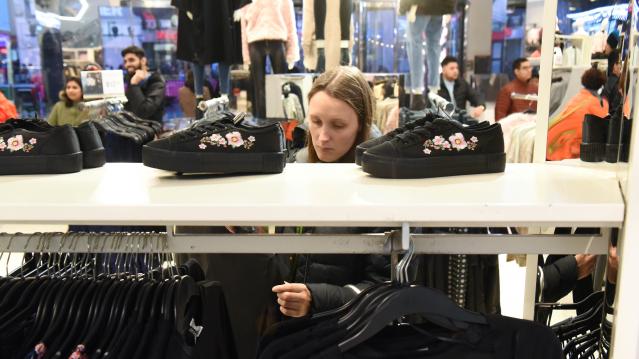One Woman Gets Revenge on Unrelenting Telemarketers

We all hate telemarketers, just as much as we hate cable companies. Put them together and it’s a lethal combination. One woman got her revenge from both yesterday when a judge ordered Time Warner Cable to pay her $229,500 after the company harassed her with 153 computer-controlled “robocalls.”
Even after Texas resident Araceli King requested and then demanded that the company stop contacting her, she received 74 more calls from Time Warner in less than a year. The company was actually leaving messages for Luiz Perez, an individual who once had her same phone number. But even after she explained her identity to a company representative the calls kept coming and King filed the lawsuit. The calls began in the summer of 2013 and King filed her lawsuit in March 2014.
Related: 18 Companies Americans Hate Dealing with Most
U.S. District Judge Alvin Hellerstein ruled that Time Warner Cable violated the Telephone Consumer Protection Act of 1991, which stipulates that consumers can sue for $500 for every unwanted call received. The judge tripled the penalty to $1,500 in this case because of the enormous number of calls.
Time Warner Cable countered that since the company believed it was calling Perez, who had consented to the calls, it was not responsible to King under the Act.
According to a telemarketer, before the National Do Not Call Registry came into effect in 2004 as an amendment to the Act, more than 137 annual calls were directed – on average -- at a single individual.
And as we all know, they usually came at dinner time or early on a Saturday morning when all you wanted to do was sleep.
Obama Faces Widespread Public Distrust on Iran Deal
President Obama will try to drum up support for the U.S.-Iran nuclear deal Wednesday afternoon at a news conference. But with widespread public disdain and distrust of Iran, Obama may have trouble convincing Americans of the wisdom of dealing with a long-time arch enemy in the Middle East.
The U.S. and Iran on Tuesday announced an agreement that would potentially block Iran’s development of a nuclear weapon for at least a decade while lifting international economic sanctions against Tehran. However, a new AP-GfK poll that was conducted just ahead of the announcement found that Americans only narrowly back diplomatic relations with the hardline Islamic government, and many want to see the sanctions kept in place.
Related: The 8 Most Important Things to Know About the Iran Nuclear Deal
Just 51 percent of those interviewed said the U.S. should have diplomatic relations with Iran while 45 percent said it shouldn’t. At the same time, 77 percent of those interviewed said the harsh U.S. and international economic sanctions against Iran should be preserved at current levels or even increased.
Only 12 percent of those interviewed thought sanctions should be decreased and seven percent said they should be eliminated altogether.
The public’s wariness and distrust of dating back to the 1979 Iranian revolution and U.S. hostage crisis matches the reception the nuclear agreement has received on Capitol Hill where most Republicans and some Democrats say they fear Obama has conceded too much to a country that has fomented terrorist activities throughout the Middle East and has repeatedly vowed to destroy Israel.
Fifty-six percent of Americans consider Iran to be an enemy, according to the poll conducted last Thursday through Monday, while an additional 31 percent consider Iran to be unfriendly but not an enemy. More than 70 percent of Republicans, half of all independents and 45 percent of Democrats described Iran as the enemy.
Related: Clinton Cautious in Her Praise of a Nuclear Deal She Helped to Orchestrate
Before the agreement was announced, six in ten Americans said they disapproved of Obama's handling of the U.S. relationship with Iran, while just over a third approved.
Obama is likely to prevail in pushing the nuclear non-proliferation agreement through Congress over the next two months, despite near-unanimous opposition from Senate Majority Leader Mitch McConnell, House Speaker John Boehner and other leaders and rank and file Republicans. Still, he will need to hold in place at least 34 of the 46 Democrats in the Senate to create a veto-proof firewall in the event Republicans push through a resolution of disapproval of the nuclear deal.
That means that Obama cannot afford any more than 12 Democratic defections to keep the agreement alive. Yesterday, Obama and Vice President Joe Biden began working the phones to shore up support on Capitol Hill, and the president will continue that effort during this afternoon’s White House press conference.
During an interview yesterday with Tom Friedman of The New York Times, Obama stressed that the deal prevented a pathway for Iran to develop a nuclear weapon while making it clear he shared Americans’ distrust of the Iranian government and had limited expectations of improved relations down the road.
Related: Iran Agrees to Limit Nuclear Weapon in Historic Deal
When announcing the deal yesterday, Obama said, “This deal is not built on trust -- it's built on verification…. We will, for the first time, be in a position to verify that Iran is meeting all of these commitments. International nuclear inspectors will have access to Iran's nuclear program -- where necessary, when necessary. This is the most comprehensive and intrusive verification regime that we have ever negotiated. If Iran tries to divert raw materials to covert facilities, inspectors will be able to access any suspicious locations.”
Why You Might Want to Cancel That Restaurant Reservation

The cost of dining out rose 3 percent in May year-over-year, while the amount paid to eat at home inched up just 0.6 percent. The growing disparity in prices could prompt consumers to abandon restaurants for home-cooked meals, according to a report today by Bloomberg.
“Eating in hasn’t been this attractive compared to dining out since 2010,” Bloomberg reports. That’s good news for consumers worried about their budgets, but could be a problem for restaurants’ bottom lines.
So far, consumers aren’t making the shift. This spring, spending at restaurants and bars totaled more than sales at grocery stores for the first time.
Related: The 11 Worst Fast Food Restaurants in America
Part of the reason consumers are sticking with restaurants could be that wages are starting to slowly increase, so consumers have a little more money to spend on meals.
They may also be dining out because it’s often an easier option. Shopping and preparing meals takes time – time that people simply don’t have these days. A quarter of employees say that they are working after the standard work day has ended, and about 40 percent work at least one weekend a month, according to Staples Advantage. That leaves little time for food prep.
Supermarkets have responded to the time-pressed consumer by increasingly offering prepared meals that require little more than reheating at home. The prices for such meals tend to be higher than the cost of their ingredients but less than the price of eating out or ordering in.
Here’s What Consumers Were and Weren’t Buying in June

Retail sales were disappointingly soft in June, continuing a zig-zag pattern of strength and weakness this year. Sales fell 0.3 percent, falling shy of economists’ expectations for a 0.3 percent gain after a 1 percent jump in May. The only spending categories to post decent gains were electronics and appliance stores sales, gas station sales and discount stores.
“In May, retail gains signaled that consumers may have started using their so-called pump price dividend toward purchases of discretionary items,” Chris G. Christopher, Jr., the director of consumer economics at IHS Global Insight, wrote in an email to clients. Now, he added, the retail data “are pointing to a consumer that spends their paycheck in fits and starts.”
Related: What the U.S. Must Do to Avoid Another Financial Crisis
Those fits and starts averaged out to a fairly healthy 2.6 percent annualized increase over April, May and June. “The glass half-full take on consumers is that 2.6 percent is still somewhat better than the 2.3 percent consumption growth we've averaged since the beginning of the current expansion,” J.P. Morgan economist Michael Feroli said in a research note. “The glass half-empty view is that there is now even less evidence of a sharp snapback in spending after an unambiguously disappointing Q1.”
Here’s a breakdown from the Bespoke Investment Group of how different retail categories fared:

7 Personal Details You Should Never Divulge Online

What do the following have in common?
- The name of your favorite movie
- Concert tickets or sporting event passes with a barcode
- Your high school
- Your mother’s maiden name
- The name of your best friend in high school
- Your full birthdate, including the year
- The street address of your childhood home
Basically, any of the answers above can be used to answer common security questions that would allow cyber thieves to gain access to an online banking or credit card account. They can be used to reset your password. That’s why you should never post these details publicly on a social media account. Even the name of a beloved pet or school mascot can be fair game.
Related: Think You’ve Been Hacked? 10 Tips to Protect Yourself Now
We already know not to post our vacation plans, where we are meeting friends for drinks or dinner, or where our children go to school. But we should be aware that information we post on our social media accounts can be used by others to profile and target us.
This is especially important when you consider that Facebook users admit that as much as 7 percent of their Friend lists, which can easily number 200 or more, are people they’ve never met in person. If you share your address and phone number on Facebook with Friends only, make sure all of your contacts are people you know; otherwise cut them from your list or relegate them to Acquaintance status.
Even if you don’t have a profile on Facebook, chances are your spouse, co-worker, or teenager does. According to the Pew Research Center, half of Internet users who do not use Facebook themselves live with someone who does. Make sure they’re not giving out your personal information too.
Shopping Showdown: Walmart Takes On Amazon’s ‘Prime Day’

In case it wasn’t already perfectly obvious that Walmart is gunning for Amazon, the Bentonville, Ark. giant just kicked up its e-tailing competition.
Walmart announced today that it will also offer thousands of discounts for online purchases on July 15, the same day Amazon plans on hosting its Prime Day shopping extravaganza. And in its blog post announcing the sales, Walmart took a clear swipe at Amazon’s push to have shoppers subscribe to its $99 a year Prime service.
“We’ve heard some retailers are charging $100 to get access to a sale,” the Walmart blog says. “But the idea of asking customers to pay extra in order to save money just doesn’t add up for us. We’re standing up for our customers and everyone else who sees no rhyme or reason for paying a premium to save.”
Related: Amazon’s Prime Concern—A New Online Blitz by Walmart
Walmart, the world’s largest retailer, is also offering another limited-time deal to boost e-commerce sales. Starting today, customers will receive free standard shipping with online purchases that cost a minimum of $35, instead of the usual $50. The change will be effective for at least 30 days.
In February, Walmart CEO Doug McMillon told analysts on an earnings conference call that the company would invest between $1.2 billion and $1.5 billion in e-commerce throughout the year.
Neither Walmart nor Amazon has released information about specific sale offers yet, so the early hype might prove unwarranted, but the battle is clearly on and now the claws are out.
Update: Amazon responded to Walmart’s gibe with its own accusation. “We’ve heard some retailers are charging higher prices for items in their physical stores than they do for the same items online,” Greg Greeley, vice president of Amazon Prime, wrote in an email to Bloomberg. “The idea of charging your in-store customers more than your online customers doesn’t add up for us.”
